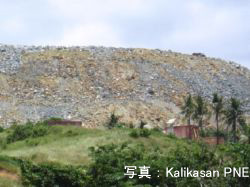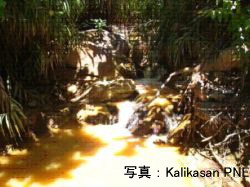Investigation of the environmental and social impacts of large-scale mining in selected mineral rich community areas in the Philippines.
 |
Kalikasan People's Network for the Environment (Kalikasan PNE) | |
 |
Clemente G. Bautista Jr. | |
 |
JPY 500,000 |
Research Background Final Report (abstract) Others

Rapu-rapu Polymetallic Mining Project(RPMP)

polluted creek
Research Background
The mining revitalization program of the Philippine government has failed to deliver its promise of economic development and has brought ill effects to the communities where the projects are located. Since the advent of the mining liberalization policy, it has been recorded that food security and sufficiency in mining-affected communities have deteriorated. Access to food sources became more limited and overall productivity has declined as vast tracts of agricultural lands were converted to industrial uses. Also, forests were cleared and water resources were polluted due to mining activities. Human rights violations like forced evictions, legal harassments and militarization are also widespread in mining areas.
Despite the glaring facts and actual unfortunate experiences of mining-affected communities, the government is still convinced that the entry of mining transnational corporations (mining TNCs) is the answer to the country's worsening fiscal crisis.
Kalikasan People's Network for the Environment (Kalikasan PNE) believes that if the current national policy of mining liberalization continues, foreign mining transnational corporations would gain much from the country's mineral resources while leaving the majority of the Filipinos in deeper socio-economic and environmental crisis. This position is backed up by the history of mining in the Philippines whose framework favors the profit generation of mining TNCs and not the welfare and development of the communities. This history is also marked by the struggle of the local residents against the present mining orientation, which will continue to be waged until the government adopts a mining policy that is pro-people and pro-environment.
In the above context, Kalikasan PNE believes that a scientific research with the objective of providing a basis and analysis that mining practices in the Philippines are ecologically destructive and greatly disadvantageous to the host communities is highly needed. This can then be used to educate and convince the public and government officials that the current mining program of the government and mining projects of mining TNCs should be suspended until its inherent flaws are corrected.
The research will be conducted in two selected mining-affected communities in the provinces of Albay and Far South Mindanao. Rapu-rapu Polymetallic Mining Project (RPMP) and Tampakan Copper Project (TCP) are the projects located in the areas mentioned and are included in the 63 priority large-scale mining projects of the Philippine government. The TMP is located in the indigenous communities in the tri-boundaries of South Cotabato, Sultan Kudarat and Davao del Sur, and RPMP is located in the small-ecosystem of Rapu-rapu in Albay. RPMP is in its commercial operation stage while TCP is in its development stage.
[January 2009]
Final Report (abstract)
Through the financial support of Takagi Fund for Citizen Science, Kalikasan PNE was able to head fact-finding missions (FFM) that looked into the socio-economic, environmental and other impacts of foreign large-scale mining in several communities in the country.
The FFMs were conducted in communities affected by the Rapu-rapu Polymetallic Mining Project (RPMP) in a small ecosystem in Rapu rapu Island, Albay and Kay Tanda Gold Mining exploration in the watershed area of Lobo, Batangas. The projects are owned by foreign mining companies, Korean-Malaysian Philippine Mining Corporation (KMP) and Mindoro Resources Limited (MRL), respectively. The two projects are included in the 63 priority large-scale mining projects of the Philippine government.
A series of consultations, with the residents, experts, local partners and other advocates, were held throughout all the stages of research to ensure that the study is grounded on the aspirations and needs of the people of the said areas. A technical working group, composed of experts, environmentalists, leaders from different sectors, was formed at the earliest stage of the study as well as an organizing team that tended to the groundwork and preparation at the local level.
After a comprehensive investigation was done, recommendations were formed on how the communities can effectively campaign their anti-mining position based on the findings of the research. Follow-up activities to sustain the support in the communities have also been conducted by Kalikasan PNE such as the medical mission in Rapu rapu and series of planning, consultations and educational activities in the area, as well as legislative lobbying to local and national government officials to support the local struggle.
The fact-finding missions and other initiatives have proven to be helpful in raising the awareness of the locals regarding the impacts of mining; uniting the communities in a common objective of asserting their rights and being active members of their communities; empowering local organizations and resident in increasing their opposition with the knowledge that other and outside groups are in solidarity with their cause; and in mobilizing volunteers and other supporters to help in the local and national anti-mining
campaign.
The research have also helped in building the capacity of Kalikasan PNE in coordinating such activities and national campaigns. This project has also strengthened the commitment of the organization to increase its participation and support to the call of mining-affected communities and advocates to change the current mining policies and other programs of the Philippine government that run counter to the interests of the people and the environment. [October 2010]
*One of the research areas was changed from Tampakan Copper Project (TCP) to Mindoro Resources Limited (MRL).
Others
